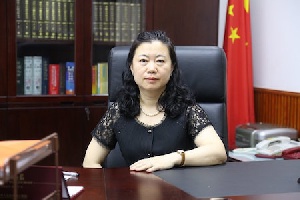China has outlined a comprehensive blue-print aimed at deepening its commitment to supporting infrastructural development and the promotion of industrialisation in Africa.
The blue-print, to be implemented in the next three years, will focus on implementing 10 cooperation plans to upgrade China-Africa’s new type of strategic partnership into a comprehensive strategic cooperative partnership.
To ensure the successful implementation of 10 cooperation plans, China has decided to provide a total of US$60billion in funding support -- which includes US$5billion grants and zero-interest loans. It also includes US$35billion loans of concessional nature on more favorable terms and export credit line, an increase of US$5billion to the China-Africa Development Fund, and a special loan for the development of African SMEs respectively, as well as the China-Africa Fund for Production Capacity Cooperation with an initial contribution of US$10billion.
Sun Baohong, China’s Ambassador to Ghana, briefed journalists in Accra on major outcomes of the just-ended 15th Johannesburg Summit of Forum on China-Africa Cooperation (FOCAC) that brought together leaders of African countries and regional organisations to renew friendships; and to plan for the development of China-Africa relations which have ushered in a new era of win-win cooperation and common development between China and Africa.
It was described as the highest, widest and most important diplomatic action China has conducted toward Africa in recent years. The summit saw Chinese President Xi Jinping co-chairing the plenary session with South African President Jacob Zuma.
Ambassador Baohong explained that the new strategic cooperation will be guided by the principle of socio-economic governance with businesses being the major actor, and market operation and win-win cooperation.
The plan is aimed at addressing three bottleneck issues holding back Africa’s development: namely inadequate infrastructure, lack of professional and skilled personnel, funding shortages. Solving these will accelerate Africa’s industrialisation and agricultural modernisation, and help achieve sustainable self-development.
Ambassador Baohong assured that China will actively promote industry-partnering and production capacity cooperation between China and Africa, and encourage more Chinese enterprises to make business investment in Africa; and will also build or upgrade a number of industrial parks in cooperation with Africa.
She promised that China will share its experience in agricultural development with Africa and transfer readily-applicable technologies to it, adding that China will step-up mutually beneficial cooperation with Africa in infrastructure-planning, design, construction, operation, and maintenance.
“We support Chinese enterprises’ active participation in Africa’s infrastructural development, particularly in sectors such as railways, roads, regional aviation, ports, electricity and telecommunications, to enhance Africa’s capacity for sustainable development -- we will also support African countries in establishing five transportation universities,” she said.
Available data show that by the end of 2014 the total stock of Chinese investment in Africa had reached US$101billion, resulting in more than 3,100 Africa-based enterprises. Two-way trade reached US$221.9billion in 2014. China has become Africa's principal cooperation partner in such areas as trade, investment, infrastructural development and economic cooperation parks.
Presently, Africa has a population of 1.1 billion people, while China’s population stands at 1.3 billion.
“Both African countries and China are developing countries facing common challenges of development and sharing broad common interests in a world that is undergoing change and will continue to undergo profound and complex changes,” she said.
“Since China and Africa established a new type of strategic partnership based on political equality and mutual trust, economic win-win cooperation and cultural exchanges and mutual learning in 2006, cooperation between the two sides has yielded fruitful results in various fields.
“People-to-people and cultural exchanges between the two sides have also been growing rapidly, with nearly 3 million exchange of visits every year, which further strengthened the social foundation and public support for China-Africa friendship.”
She observed that Africa has become one of the fastest-growing economies and most promising continents in the world, growing into an important pole in the global political arena, a new pole of global economic growth, and a splendid pole of the human civilisation.
“China has grown into the second-largest economy in the world, and is an important participant, builder and contributor to the existing intentional system.
“Strengthening solidarity and cooperation with African countries has always been an important cornerstone of China’s independent foreign policy of peace, and its firm long-term strategic choice.”
Ambassador Baohong added that upgrading the China-Africa relationship into a comprehensive strategic cooperative partnership is demonstrates the importance of China-Africa relations, and is the natural result of expanding their comprehensive cooperation, which marks a leap in the positioning of China-Africa relations.
“It points the way forward for future China-Africa relations, and has opened up broader prospects for China-Africa mutually beneficial cooperation in a wider scope, broader dimension and higher level.”
Business News of Sunday, 27 December 2015
Source: B&FT













